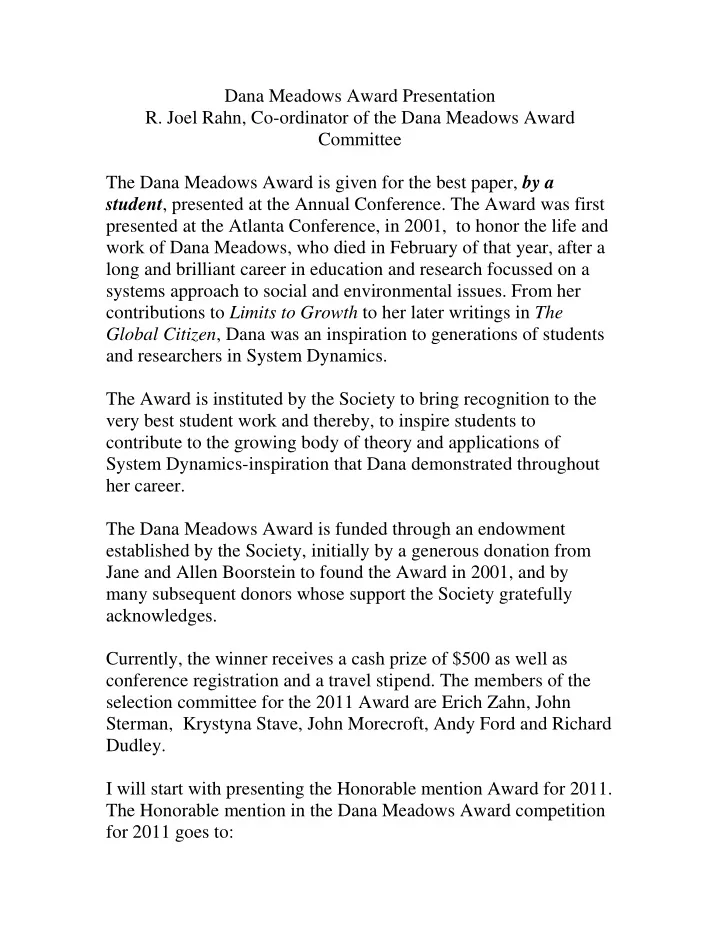

Dana Meadows Award Presentation R. Joel Rahn, Co-ordinator of the Dana Meadows Award Committee The Dana Meadows Award is given for the best paper, by a student , presented at the Annual Conference. The Award was first presented at the Atlanta Conference, in 2001, to honor the life and work of Dana Meadows, who died in February of that year, after a long and brilliant career in education and research focussed on a systems approach to social and environmental issues. From her contributions to Limits to Growth to her later writings in The Global Citizen , Dana was an inspiration to generations of students and researchers in System Dynamics. The Award is instituted by the Society to bring recognition to the very best student work and thereby, to inspire students to contribute to the growing body of theory and applications of System Dynamics-inspiration that Dana demonstrated throughout her career. The Dana Meadows Award is funded through an endowment established by the Society, initially by a generous donation from Jane and Allen Boorstein to found the Award in 2001, and by many subsequent donors whose support the Society gratefully acknowledges. Currently, the winner receives a cash prize of $500 as well as conference registration and a travel stipend. The members of the selection committee for the 2011 Award are Erich Zahn, John Sterman, Krystyna Stave, John Morecroft, Andy Ford and Richard Dudley. I will start with presenting the Honorable mention Award for 2011. The Honorable mention in the Dana Meadows Award competition for 2011 goes to:
*David Keith, System Dynamics Group, Sloan School, MIT for the paper "Understanding Innovation Diffusion in the Presence of Supply Constraints and Price Feedback: The Case of the Toyota Prius ". This study presents a thorough analysis of the effects of endogenous factors of supply constraints and price on the diffusion of a new automotive technology represented by the Toyota Prius. It was distinguished by the use of novel data sets as well as more conventional econometric data to establish, rigorously, feedback relationships that explained the effects observed. This year’s winner of the Dana Meadows Student Award for the best student paper presented at the annual conference is: Navid Ghaffarzadegan in the Department of Public Administration and Policy, at the University at Albany, State University of New York, for the paper " Beyond Personality Traits and Financial Incentives: Bias and Variation in Medical Practices as Results of Experiential Learning ". This paper presents an interesting application of discrete event, agent-based simulation with feedback to decisions made by physicians. It addresses the question of why physicians make sub- optimal decisions in obstetric care and shows that such decisions can result from experiential learning rather than personality traits or other bias. A very interesting analysis of decision making by physicians as affected by risk aversion, financial incentives and use of defensive strategies. -Very well referenced, references clearly fit in with the discussion. -Presents a new explanation for sub-optimal medical decision making. -Creatively uses SD and related approaches in a relatively concise SD model
A model incorporating such a broad range of expertise inevitably draws comment from experts in the various disciplines it touches and such was the case for this paper. Nevertheless, the Award Committee considered this paper to be a fine contribution meeting the objectives and the high standards of the Dana Meadows Award. Out of the 22 student papers submitted for this year's awards, these were regarded as excellent papers and worthy contributions to System Dynamics. The authors are to be congratulated for their efforts and their success in analyzing and providing insight into significant dynamic issues.
Recommend
More recommend